#The Dark Compass
Text
Riddles of the Sphinx
There are a few things in BBC Dracula that I just can’t seem to let go of, and this is one. I’ve tried to write this meta a few times, and never found a particularly satisfying “solution” to it, but I think now it’s time to present it.
In the final episode of BBC Dracula (The Dark Compass), Mark Gatiss plays “Frank”, a modern-day version of Bram Stoker’s Renfield, who eats insects and is enthralled to Count Dracula. The extent to which Frank’s mind has been overtaken by Dracula is demonstrated by his... unique... solution to a cryptic crossword. Like Jonathan Harker’s journal in the first episode (The Rules of the Beast), Frank thinks he is writing rational, intelligible text in his crossword, but it all comes out in Dracula, with a single phrase spilling out over the grid.
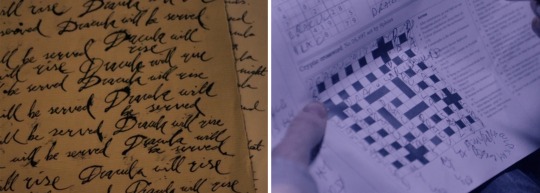
“Dracula will be served” | “Dracula is my Lord”
Spoilers under the cut for the Inside No.9 episode The Riddle of the Sphinx, which is among the best episodes of that series (though should probably come with a few trigger warnings); if you’ve been planning to watch it, please do so before reading further.
The crossword Mark is solving in The Dark Compass was set by someone named “Sphinx”, and this is why I find it interesting. Sphinx is a pseudonym for Mark’s longtime League of Gentlemen collaborator Steve Pemberton. This isn’t the first crossword that Pemberton has written; in fact, his first (co-written with cryptic expert Alan Connor) was the central theme of an episode of Inside No.9, which is co-written by and co-stars Pemberton and another League of Gentlemen alum, Reece Shearsmith. For those who are unfamiliar, Inside No.9 is an anthology series, with half-hour episodes that are usually a mixture of horror and comedy.
The Riddle of the Sphinx is about a Cambridge professor who writes cryptic crosswords for the student newspaper; one night, a young woman breaks into his rooms, demanding that he teach her how to solve his puzzles. Together, they work their way through his latest creation, which was quietly published in the real-life Guardian newspaper on the day the episode aired in February 2017.
In the first scene of the episode, Sphinx brandishes a weapon at the intruder, a prop gun from a student performance of Anton Chekhov’s The Seagull. The gun is then safely stowed away until the end of the episode, when we’re told explicitly that Chekhov’s gun cannot simply remain in the drawer:
TYLER: Never show a gun in Act One if you’re not going to fire it in Act Five.
I do hate to have a joke explained, but never fear, they gave us an unexplained joke, too. The intruder goes by the name Nina. When we meet her, Nina appears not to understand the workings of the cryptic crossword, but soon we learn that she’s actually an expert. Not enough of an expert, however, to have noticed a hidden clue in the crossword that could have saved her life.
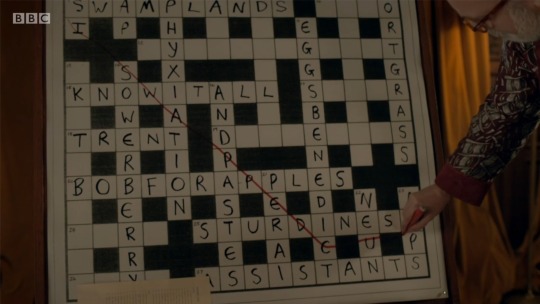
I S W A P P E D C U P S
The unexplained joke is that in a cryptic crossword, a hidden clue of this sort is called a “Nina”.
Sphinx takes his own pseudonym from the same mythic figure that gives the sphinx cat (like Sekhmet, who was blamed for murder in Sherlock’s The Great Game) its name. The riddle of the sphinx is well known to everyone: What walks on four legs in the morning, two legs in the afternoon, and three legs in the evening? The three stages of the riddle describe the ageing process, such that the answer is “a man”. According to the myth, the sphinx asphyxiated and consumed anyone who could not answer the riddle correctly; when finally the riddle was answered by Oedipus, the sphinx destroyed itself. Most of these beats are also hit in this Inside No.9 episode.
So, as you can see, The Riddle of the Sphinx is all rather meta; as his first lesson for Nina, Sphinx creates a hypothetical 7-word clue that is meant to be solved as “ARCHITECTURE”...
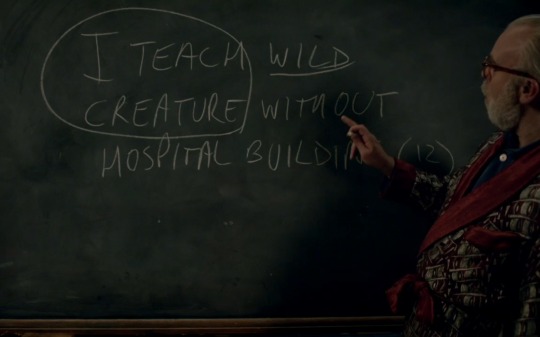
... but which is actually a half decent summary of the night’s events. This, in itself, is fitting, because a cryptic crossword clue is typically composed of two parts: the definition of the word, plus a bit of wordplay to help you solve it. Ordinary crosswords trade in relatively straightforward definitions; the cryptic crossword requires creativity, it requires looking at the clues from different angles, and I would say it also requires a sense of humour.
So, to hammer that metaphor home: Nina is asking Sphinx to teach her how to read his subtext, so that she can win the game.
Steve Pemberton has published a few other cryptic crosswords as Sphinx since The Riddle of the Sphinx aired, one in January 2018, when the subsequent series of Inside No.9 aired, and one in August 2020, which was solved on the YT series Cracking the Cryptic, if you’d like to see how an expert tackled it.
Like the crossword in The Riddle of the Sphinx, the Dracula crossword was also published in the Guardian on the day that The Dark Compass aired, in January 2020. And while the solution Mark’s character “Frank” offers is Dracula-focused but, well, insane, the actual solution to the crossword is a bloody, vampiric thing in its own right, as shown in these highlighted examples in the solved crossword below.
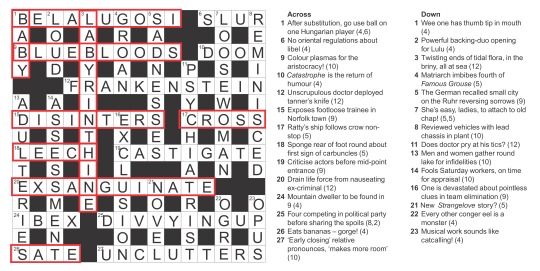
You may notice that I’m trying to be conservative here; I might also have included “DOOM”, “NOVEL”, “PSYCHIATRIST”, and perhaps a few others (”IBEX” is particularly tempting, for its devil horns) as Dracula-related. There are also a few treats among the clues, including:
20A Mountain dweller to be found in 9 (4)
...which has a clue “inside no. 9″ (9 = IX, and “BE” is found within it), such that there’s an Inside No.9 reference in each episode of Dracula, which is pleasing.
So, when I first heard that the Dracula crossword was set by Sphinx, what I wanted from it was a Nina... the potentially life-saving clue, hidden in plain sight. I haven’t been able to find one in it; in fact, I don’t think any of Sphinx’s cryptic crosswords since the original have included Ninas, which strikes me as odd, given their prominence in Riddle of the Sphinx (in the end, there were two in that crossword alone) and the value of hidden clues in Moffat and Gatiss’s work.
And for that reason, I might not have written up this meta if it weren’t for @victorianpining‘s reading of BBC Dracula, which casts Dracula as a stand-in for the writers. In this adaptation of Dracula, we are told repeatedly: blood is lives, and more specifically, blood is stories. Agatha tells Jonathan this as she holds his indecipherable manuscript in her hands: “Perhaps stories flow in our veins, if you know how to read them”. In the novel, Jonathan, as a diarist enthralled to Dracula, is a self-insert for Bram Stoker, just as John Watson the chronicler was a self-insert for Arthur Conan Doyle, writing stories in both text and subtext. In BBC Dracula, Moffat and Gatiss appear to have boldly claimed Dracula himself as their self-insert. And look how well this works... in their universe, blood is stories, and their thirst is insatiable. Stories grant them immortality, but what keeps them young is the game. It’s being understood by a present-day audience. It’s Jonathan. It’s Lucy. It’s us. It may be intellectually satisfying to sit in one’s room setting puzzles, but if no one else can understand them, what’s that worth? Sphinx persuades Nina to keep playing after she threatens to leave, for exactly this reason. Genius needs an audience. Artists always wish to be understood.
I briefly mentioned a third character in Riddle of the Sphinx above (he’s also the ‘mystery guest’, 12 Across, in that crossword). As he says to his host,
TYLER: I always hated cryptic crosswords. Why can’t people say what they mean, rather than trying to trick you all the time?
And from 2017, that’s a familiar sentiment. In Riddle of the Sphinx, both Nina and Sphinx have a go at murdering each other—through the game—but they would both have survived if it weren’t for the interference of this outsider, who insists that the prop gun be used for real. Tyler ends the game, and cuts short Sphinx’s immortality, ensuring that he fulfills his namesake’s destiny by destroying himself.
So, even without the pleasure of finding a Nina, the Dracula crossword resonates with these themes, on a micro-scale. We watch Mark, pen in hand, playing a game that requires decoding encrypted clues; the solution he shows us (repeatedly, “Dracula is my lord”) is nonsense, and suggests that he is self-obsessed (a writer of Dracula obsessed with his own self-insert). But if we reject that surface solution, and figure out the cipher for ourselves—if we act as the Nina here—we find blood. We find stories.
Among these crossword clues, the one we hear Mark read aloud as he sits waiting for Dracula in The Dark Compass is the same one he tweeted along with the Guardian story:
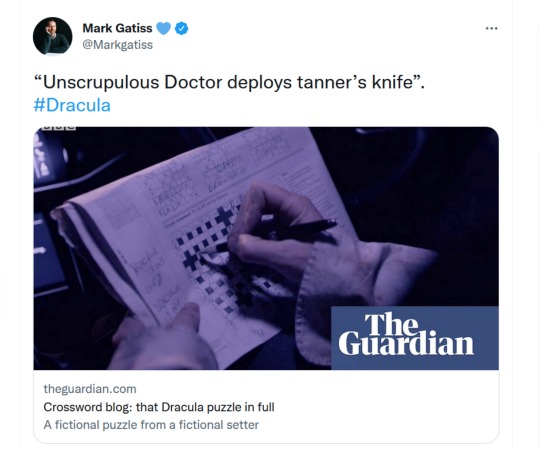
A Mark Gatiss character wields a pen while playing a game. #justmofftissthings
The clue for 12 Across is easily recognized as not being about Dracula at all, but a different Victorian story, Frankenstein. This solution is a little too on the nose for even an “&Lit” clue (cryptic-speak for a relatively literal clue). And maybe Mark quoted it in his tweet because an easy clue makes for a better hook for the show. Or maybe he quoted it because he’s a fan of Victorian horror generally. But as someone used to seeing double meanings in both cryptic clues and literary subtext, I can’t help but be reminded of another unscrupulous doctor, who might also be described as a “tanner”. This ‘mystery guest’ doesn’t fit the grid, but... that never stopped Mark, now did it?
And of course...
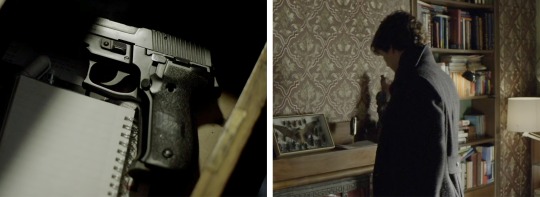
... you know what they say about a weapon introduced in the first act.
#BBC Dracula#Inside No.9#Sherlock#The Dark Compass#Riddle of the Sphinx#Steve Pemberton#Mark Gatiss#cryptic crosswords#text and subtext#learning the rules of the game#blood is lives#blood is stories#Chekhov's gun#BBC Dracula meta
61 notes
·
View notes
Photo
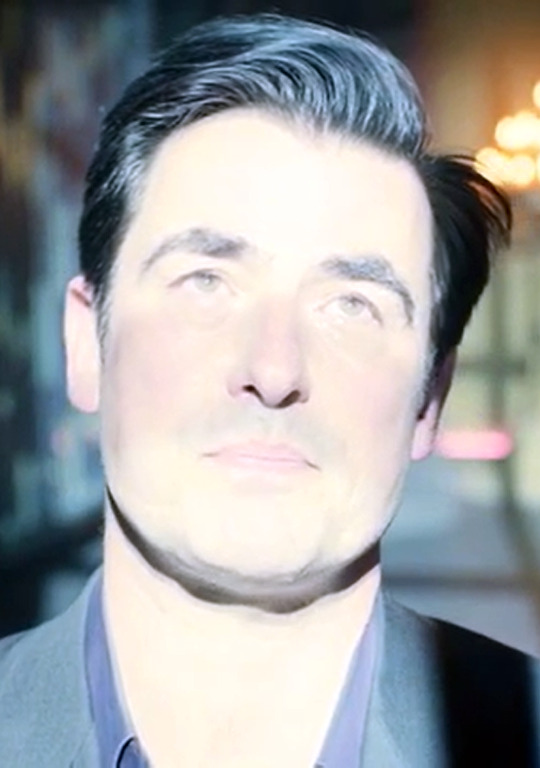
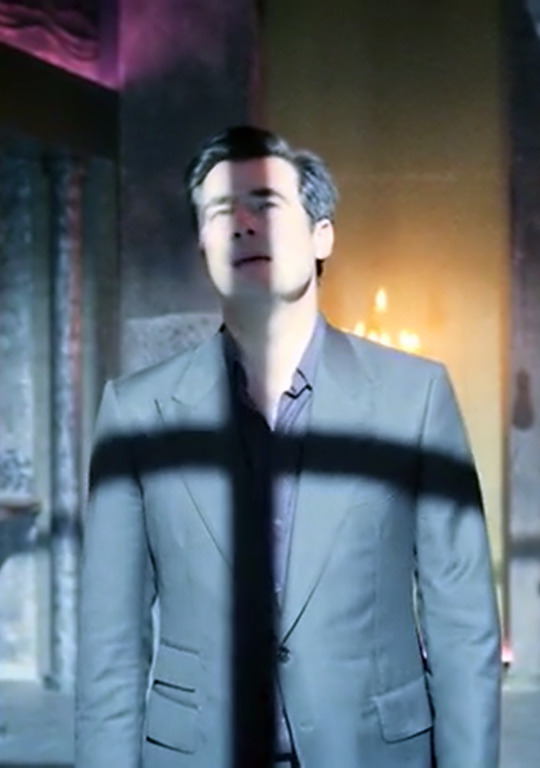
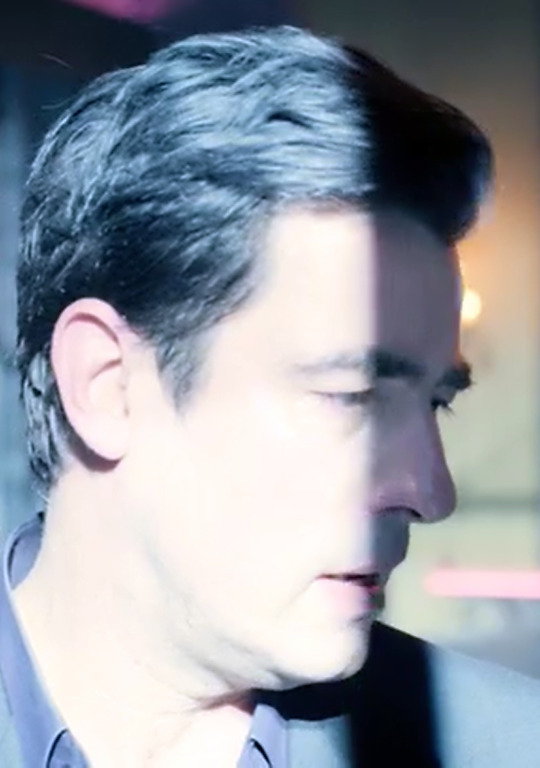
Dracula 1.03 | The Dark Compass
12 notes
·
View notes
Text

#maviyenot#couple#couple aesthetic#goals#photo#cute#romantic#hood#indian#picture#love#love quotes#quotes#couple photography#dark#soft#hidden#vintage#tragic#photography#preppy#mirror#pictures#kissing#smooch#compassion#kindness
2K notes
·
View notes
Text
another year is ending and I want you to know that it is okay if you:
have not healed from the things that happened/did not happen from six months ago. just because the year is ending it does not mean your grief is too.
don't have any "fun" NYE plans to ring in the new year. this life is yours to live across days and months and years, and you can celebrate days other than the ones heavily marketed and shoved down your throat to shroud you in severe FOMO.
have no resolutions or goals for 2024 laid out in elaborate lists or shared on social media or with your friends. you are braving through this life trying to do your best every day and hold the fort and so of course you know, deep down you know what is needed from you for you going forward and of course you are going to work in that direction. good luck love.
have not become a "better" version of yourself by any of the tangible or conventional measures. that kind of bettering is mostly to serve others, not yourself.
are not happy with yourself/your life as it is now. you're a work-in-progress, remember? and if you're progressing in a direction you do not like, then it's time to change the blueprints and the strategy.
take time off social media around this time to protect your mental health and whatever little joy you have managed to keep.
don't want to spend too much time reflecting on how this past year went and doing various forms of 2023-wrapped. again, it's your life. you can also revisit this year in memories and pictures and feelings whenever you'd like. it's not like you don't still visit 2012, 2017, and 2022, right?
feel disconnected from your friends, family, lover. I know this is "ideally" a time to be celebrated with your loved ones. but life is not ideal, is it? it's just life. and if right now you are not feeling the love, the joy, or just don't have the headspace or social energy to engage , that's alright.
are finding comfort in simpler things like a TV show from the 90s or that book you first read at sixteen or that slice of strawberry cake or a random post like this you come across.
don't feel hopeful, encouraged, or excited for 2024. given everything that's happened in the last couple of years, on the macro and micro level, it's only natural for you to feel weary as well as wary. when the good things happen, when the healing happens, when things begin working in your favour over time, you will automatically feel all those things. it's okay if until then you choose to be neutral.
#notes to everyone#goodbye 2023#writerscreed#poeticstories#twc poetry#inkstay#hello 2024#nye#new year#new year eve#nye 2024#year end#notes to self#self care#self compassion#mental health#mental wellness#words to live by#dark academia#desiblr#poetryportal#writers on tumblr#poets on tumblr#december 2023#words of affirmation#words of wisdom#it's okay#it's ok to not be ok#spilled ink#creatingnikki
2K notes
·
View notes
Text
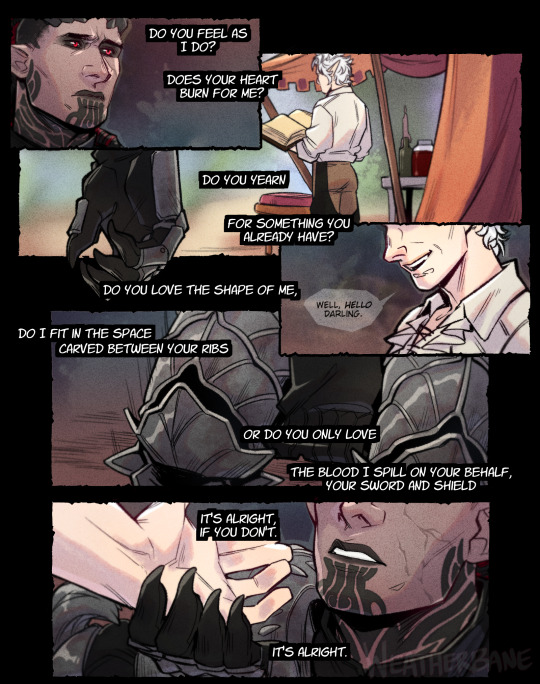
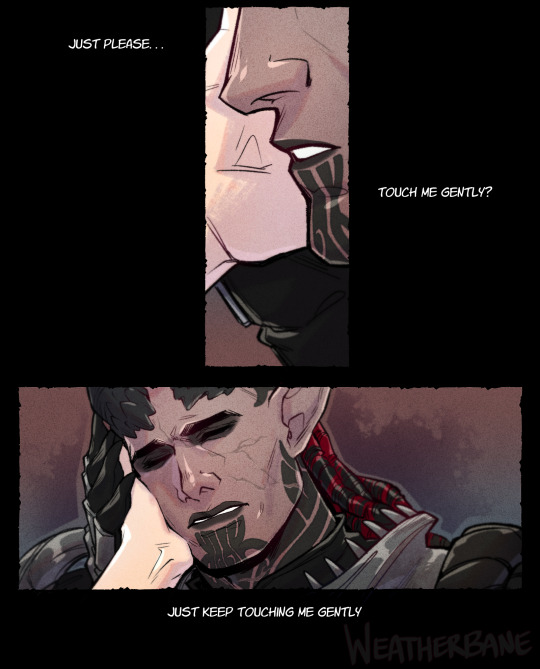
area Durge willing to experience potentially unrequited love as long as they get to try brand new things such as TouchTM
#bg3#bg3 tav#bg3 art#durge#dark urge#look man i just have a lot of feelings about Guy Raised In MurderDeathSadism Cult-#falling in love with.... Guy In Vampire MurderDeathSadism Cult#and both of them being like yeah this relationship is probably fake but i'm willing to use my body to keep it going bc-#how else do you get people to care about you except for providing ServicesTM#BUT ALSO i get very BARKWOOF over guard dog and guy who should not be a moral compass dynamics so u kno#my ocs#tav: darias#weatherdraws
1K notes
·
View notes
Photo
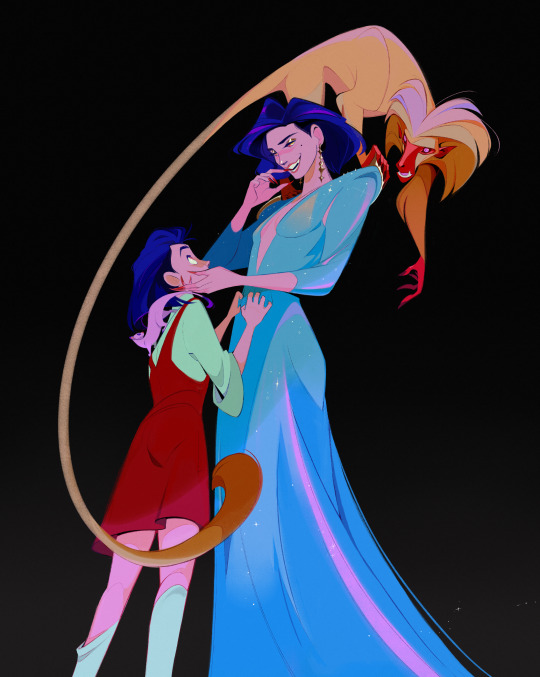
Boadicea
#marisa coulter#lyra belacqua#his dark materials#the golden compass#my art#this song reminds me of Mrs.Coulter....#Alluring and beautiful with an ominous (sinister) undertone
5K notes
·
View notes
Text
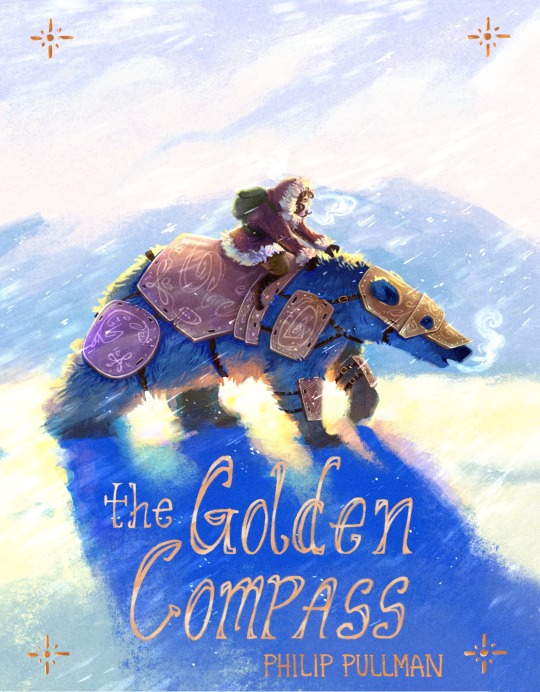
Just revamped this Golden Compass illustration I did about two years ago, and wanted to post since I’m kind of in a winter mood! hand drawn typography by yours truly :P
#my art#the golden compass#iorek byrnison#lyra silvertongue#lyra belacqua#kids lit art#book illustration#book cover illustration#children’s book illustration#digital illustration#artists on tumblr#art#illustration#painting#digital painting#philip pullman#his dark materials#typography#winter illustration#hdm
949 notes
·
View notes
Text
“The donations are striking because American Compass is a partner organization in Project 2025, a controversial right-wing think tank that has been building the policy and personnel firmament for a second Trump administration.
Project 2025 is an arm of the Heritage Foundation and it has been criticized for its hard-right, authoritarian agenda—including “dehumanizing” rhetoric towards the LGBTQ community, re-upping Trump’s attempt to include citizenship on the census, leveraging the power of the Justice Department to crack down on critics, and a potentially unconstitutional plan to sic U.S. troops on domestic protesters.”
Many oligarchs and corporations have tried to mask their right-wing connections with small donations to left leaning institutions like NPR.
The Walton family oligarchs in particular (Walmart/Sams Cub) began scrubbing the internet and hiding their right-wing ties following calls for boycotts. This began during the two terms of Republican warmongers Bush/Cheney. Walmart is particularly susceptible to boycott because they lack the diversification of other oligarchs like the Koch family. But in fact they donate to Project 2025 and other high profile right-wing initiatives that we progressives protest against.
*As a side note many still refer to the Koch brothers but this is inaccurate as one died during the Trump years and is now rotting in Hell. Other members of the family hold power and run various programs and initiatives with the Republicans.
#Walmart supports Project 2025#republican assholes#traitor trump#crooked donald#project 2025#dark money#vast right wing conspiracy#American Compass
173 notes
·
View notes
Text
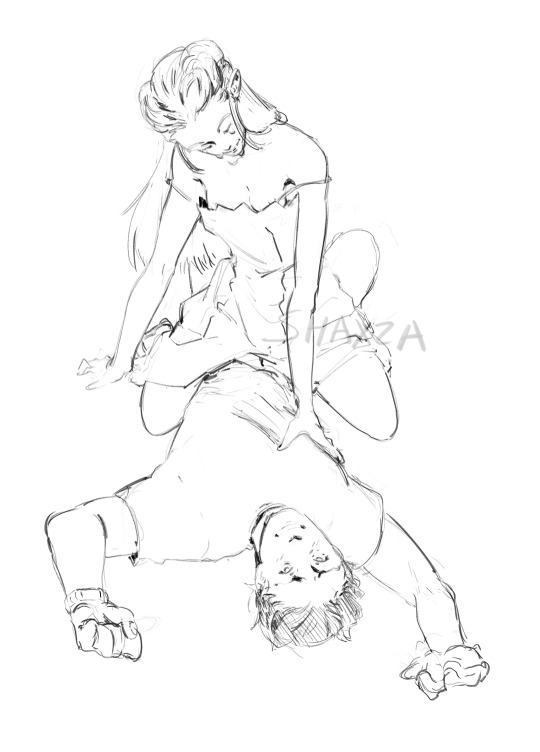
#dahlia hawthorne#ace attorney#phoenix wright#dahlia x phoenix#alexa play dark red by steve lacy#my art#since i dont want to make a dedicated post let me use my notes to vent about how much i love dahlia conceptually and how much i wish AA +#writers weren't sexist#dahlia was given the shittiest set of cards when she was a kid and she was a victim of grooming by that terry loser#she is CONSTANTLY objectified and sexualised and i think her design as a skinny young looking individual makes it even more distasteful#but i think it works if the writers could have done something with that#what i love about dahlia and phoenix's relationship is the contrast - phoenix needs to see people as innocent before jumping to help them v#dahlia who has if you think about it is innocent to a degree given how fucked up her childhood was#dahlia could have been a great case study into compassion for phoenix as she has hurt him directly but in his role as a lawyer he has to se#past certain flaws so justice can be served#and it can PUSH his understanding of what is “guilty”#yes dahlia killed people but also i choose to believe her worldview was severely warped by her enviornment and she's a product of it#or if they wanted to make her a villain and stick with it i think as a rival ro phoenix she should have been a cautionary tale#of what happens when you never learn to move beyond the shitty hand youve been dealt with and live non judgementally#anyways ^_^
292 notes
·
View notes
Photo

"My armor is made of sky iron, made for me. A bear's armor is his soul” -Iorek Byrinson 🐻❄️
#the golden compass#his dark materials#polar bear#animals#art#fanart#fantasy art#books#fiction#hbo#iorek byrnison
874 notes
·
View notes
Text
lyra (11 years old): crying in the snow beneath the northern lights, bent over the corpse of her dearest little friend for whom she crossed the whole of the world
mrs. coulter and lord asriel two feet away:

#FUCKING CRAAAAAAAZY JUST AS CRAZY NOW AS IT WAS WHEN I WAS LIKE 8. WHAT ARE YOU PEOPLE DOING.#his dark materials#the golden compass
120 notes
·
View notes
Text
#phillip pullman#megan whalen turner#his dark materials#hdm#the queens thief#the queen's thief#round 4#polls#fantasy book tournament#the golden compass
540 notes
·
View notes
Text
About The Dark Compass and taking place in 2020 a.k.a. the year the series was aired.
Bram’s Stoker’s Dracula was published in 1897 and it was mostly written in the 1890s. The story takes place in 1897. Jonathan Harker visits Dracula’s castle in 1897. The story is contemporary to its writing time.
There are so many literary and academic articles written about Stoker’s Dracula and its major themes that we can safely say it could be used as a social commentary and/or criticism of the Victorian era.
Social disparity between classes, between men and women, between rich and poor.
“Dracula presents a series of contrasts and clashes between old traditions and new ideas. Stoker uses the figure of the vampire as thinly-veiled shorthand for many of the fears that haunted the Victorian fin de siècle.”
Dracula’s forays into London, for example, and his ability to move unnoticed through the crowded streets while carrying the potential to afflict all in his path with the stain of vampirism, play upon late-Victorian fears of untrammelled immigration.
A number of scholars have indicated that Dracula's version of the vampire myth participates in antisemitic stereotyping.
The Jack the Ripper murders had created a storm of hysteria in the press with the local Jewish community bearing the brunt of the outbursts. The secretive nature of the Jewish ghetto was also cited as a reason why the murders were never solved, with the Jews seen as having closed ranks around one of their own number who had committed the crimes. Such fears, which Dracula mirrors very closely, ultimately lay behind the introduction of The Aliens Act of 1905, which was put in place largely to stem immigration from Eastern Europe.
The act of vampirism itself, with its idea of tainted blood, suggests the fear of sexually transmitted diseases such as syphilis.
Victorian literature tends to present the vampire myth as a sexual allegory in which English female virtue is menaced by foreign predators. Sexuality and seduction is a major theme especially as it relates to the corruption of English womanhood. The Count’s attentions focused in particular on Mina, a woman who selflessly spends her honeymoon nursing her sick husband in a convent, and the beautiful Lucy Westenra, who is, by contrast, dangerously modern in her ways.
Sexual depravity and aggression were understood by the Victorians as the exclusive domain of Victorian men, while women were expected to submit to their husband's sexual wishes. Harker's desire to submit to Dracula’s brides, and the scene's origin as a dream Stoker had, highlights the divide between societal expectations and lived realities of men who wanted more freedom in their sexual lives.
Bram Stoker includes numerous references to the very latest ideas and inventions in his novel; a phonograph used by Dr. Seward to keep his diary was a new and expensive piece od technology in 1897, Kodak cameras, telegrams sent across Europe, blood tranfusions, portable typerwiters refect the technological changes in the late Victorian era. [1]
There are many themes to derive from Stoker’s Dracula and apply them to Victorian society, but in the end Gatiss & Mofatt’s Dracula was made in 2020.
I’ll be honest and admit that the rapid change in cinematography was a bit jarring in first viewing but the more times I watch The Dark Compass the more i like it.
For exactly it is what Dracula has been in 1897; a social commentary, and it’s done in a way alluring and witty, IMHO. Cameras, helicopters, instagram, smartphones, skype interact with mercinaries, illegal funding, corruption veiled under noble actions.
This Count Dracula is closer to Vlad Tepes, a warlord, a Prince, Wallachia’s ruler, diplomat, prisoner, manipulator, intelligent, adapting. Does the end humanises in a way the original novel never did? Quite possibly. But how could it go differently in 2020 if we consider everything we wrote about the Other, the different race?
What’s to criticise in 2020? Conspiracy theories? Smartphones and Instagram? Beauty? Mental illness? Cancer? How is any of these everyday issues treated in the series that don’t ring right in our ears? Lucy loves her beauty, flirts with Death but wants to keep her beauty and live forever? Why would that attract Dracula? This incarnation of Dracula? Zoe/Agatha explains it in the end, but Dracula explained it before.
“I shall look for the perfect food of this world.”
One of my favourite scenes is Dracula’s dialogue with Zoe about rights. She assumes, quite rightly, that feminism is not something he’s aware of. Rights, she says and she catches his attention.
Rights.
“Nobody has rights, Zoe.
Man, woman or monster.
No-one, nowhere.
It's just a lunatic fantasy.”
And it continues with the greatest way I have witnessed of taking the noblest of ideas and twisting it to fit the “monster”.
“What's against the law is you locking him up. I think you might have forgotten,Dr Helsing...
Count Dracula has rights.”
And I simply love Frank Renfield.
Just as much as I love the Dark Compass, which in my opinion, is a great tribute to the original, altered to fit our times.
8 notes
·
View notes
Text
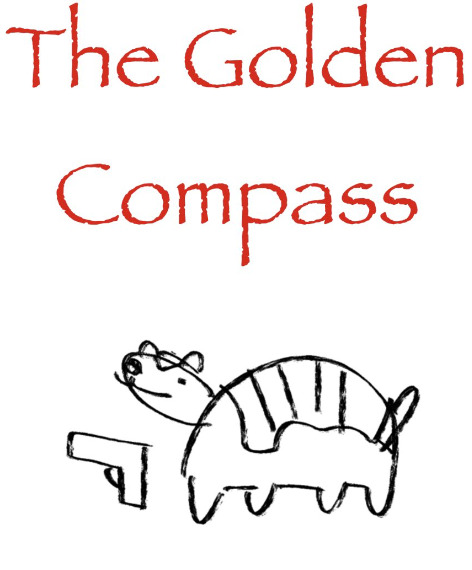
136 notes
·
View notes
Text
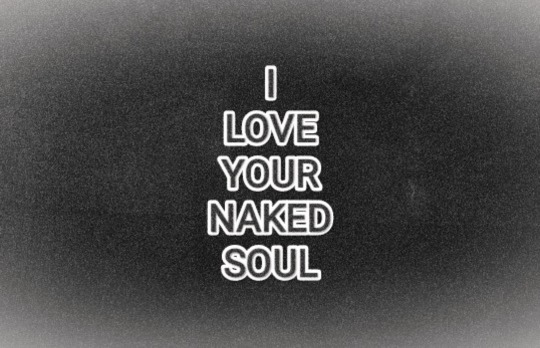
#soul#love#vulnerable#authenticity#effective communication#acceptance#compassion#light and darkness#courage#skritch skritch
83 notes
·
View notes
Text
I love series where the main character(s) didn’t actually save the world to save the world.
They were just doing something else and happened to save the world at the same time.
#lyra silvertongue#lyra belacqua#kaz brekker#six of crows#his dark materials#the golden compass#the subtle knife#the amber spyglass#grishaverse#shadow and bone#nina zenik#matthias helvar#jesper fahey#wylan van eck#inej ghafa#text post#for the crows it was money#for lyra her BFF JUST DIED#like give her a break
280 notes
·
View notes